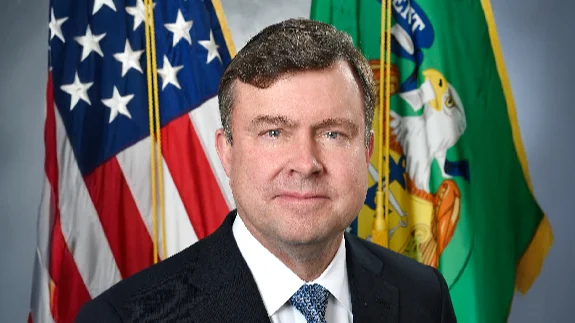John K. Hurley, the Under Secretary of the Treasury for Terrorism and Financial Intelligence (TFI) | Official Website
The U.S. Department of the Treasury’s Office of Foreign Assets Control (OFAC) has announced sanctions against individuals accused of channeling tens of millions of dollars from Iran to Hizballah in 2025. The funds, moved through exchange houses that take advantage of Lebanon’s cash-based economy, are said to support Hizballah’s paramilitary operations and infrastructure.
According to the Treasury, these activities undermine efforts by the Lebanese government to assert control over its territory and threaten the integrity of Lebanon’s financial system by mixing illicit terror financing with legitimate business transactions.
“Lebanon has an opportunity to be free, prosperous, and secure—but that can only happen if Hizballah is fully disarmed and cut off from Iran’s funding and control,” said Under Secretary of the Treasury for Terrorism and Financial Intelligence John K. Hurley. “We will work with our Lebanese partners to create a resilient economy that puts the interests of all Lebanese citizens front and center.”
The sanctioned operatives include those overseeing money transfers from Iran into Lebanon via both licensed and unlicensed money exchanges. The Treasury stated that lax oversight at some exchange companies allows Hizballah to exploit Lebanon's cash economy for laundering purposes.
This action comes as Lebanon continues to address risks associated with Hizballah's financial activities following its 2019 financial crisis.
The designations were made under Executive Order 13224, which targets terrorists and their supporters. Hizballah was previously designated as a Specially Designated Global Terrorist in 2001 and as a Foreign Terrorist Organization in 1997.
Since January 2025, over $1 billion has reportedly been transferred from Iran's Islamic Revolutionary Guards Corps-Qods Force (IRGC-QF) to Hizballah, mostly through money exchange companies.
Among those named is Ossama Jaber, identified as a key facilitator working directly with Lebanese money changers on behalf of Hizballah. Between September 2024 and February 2025, Jaber collected or converted tens of millions of dollars using various exchange firms linked to Hizballah members.
Hizballah’s ability to move funds was affected by the collapse of Syria's Assad regime in December 2024—a long-standing supporter—and by internal changes after the death of finance chief Muhammad Qasir in October 2024. Responsibilities have since shifted among multiple individuals including Ja’far Muhammad Qasir (Qasir’s son) and ‘Ali Qasir (Qasir’s nephew). In mid-2025, these individuals attempted recovery efforts involving an oil tanker seized by Indonesian authorities in 2023.
Ja’far Muhammad Qasir also worked with Syrian businessman Yasar Husayn Ibrahim on sales related to Iranian oil products for Hizballah. Other figures involved include Samer Kasbar, director at Hokoul SAL Offshore Company; together they facilitated exports from Iran including metals and chemicals.
Ossama Jaber, Ja’far Muhammad Qasir, and Samer Kasbar have now been designated for providing material support or services for Hizballah under E.O. 13224.
As a result, all property belonging to these individuals within U.S. jurisdiction is blocked; entities owned at least half by them are also subject to blocking measures. U.S. persons are generally prohibited from transactions involving these designated parties unless authorized by OFAC licenses or exemptions.
Violations may lead to civil or criminal penalties under strict liability rules outlined in OFAC enforcement guidelines; foreign institutions engaging significantly with designated persons risk secondary sanctions affecting their access to U.S.-based accounts or services.
OFAC emphasized that while it maintains authority over adding names to its Specially Designated Nationals list (SDN List), it can also remove names consistent with legal requirements if behavior changes: “The ultimate goal of sanctions is not to punish, but to bring about a positive change in behavior.” Information on removal petitions is available through OFAC guidance.





